SMEs account for providing large opportunities for employment, job creation and GDP in developing countries economy. New jobs boost living standards and social solidarity in a country. Therefore, SMEs are one of the key factors for a country’s economic growth. SMEs are moving forward with sustainability initiatives to save energy, improve efficiency and build supply chains. Many SMEs, especially those in the manufacturing sector, have realized that they could become the preferred partners of bigger corporations by adopting eco-friendly and sustainable practices.
As many SME businesses have been hit financially hard by the COVID-19 pandemic, this leads to informational asymmetry in such a way that SMEs are unable to obtain loan from the commercial banks. Commercial banks should relax their risk management criteria in order to allow SMEs which still have problems to borrow funds, so that they can continue their businesses. Governments need to issue regulations to incentivize SMEs to rise such as subsidy and network of consultants for SMEs.
SMEs provides opportunities for transition of circular and sufficient economy. Based on such analysis, Circular Economy recommends that policy makers should target innovative green- SMEs as an effective platform to promote financial de-risking while addressing sufficiency economy goals. This should be achieved by creating signals for private investors. Asia-Pacific region would ensure that greening SMEs become the basis for attractive, low risk investment opportunities for the private sector, and thus economy wide transition to circular and sufficiency economy.
Related Articles
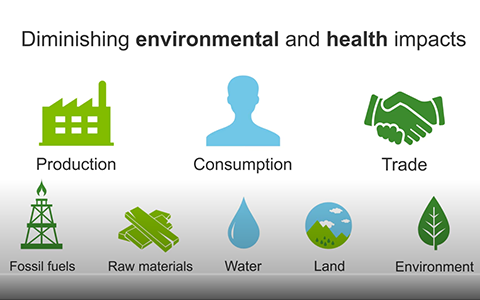
The concept of circular economy on SME and the examples of its concept is explained in this VDO. The VDO has been split into 3 parts: What can you do on your own, What can you do with your business partners?, What is the European Union doing for you?
WATCH VIDEO
In recent years, most of the circular economy initiatives have come from large scale industries with capable of technology they regenerate the materials which is used in own production process. But many young Asian entrepreneurs has proven even a small-scale enterprises (SME) business can benefit from leftover materials in small scale industry. They have initiated to the concept to green their operation or start business of their own and have great potential in circular economy. Moreloop to make circular economy a reality Thai entrepreneur Thamonwan Virodchaiyan started using textile waste materials in garment factories as a part of chain of value and opportunity. They sell leftover fabrics without producing it to the individual or the company. Since it has saved huge amount fabric wastage to be dumped out, which support the reduction of carbon dioxide CO2 emission.
READ MORE
The SME sector is the largest employer in any economy, and it plays a crucial role in developing countries. SME is the main factor for economic growth and job creators in low-income countries. Demand for credit from micro, small and medium-sized enterprises is high and growing. There is high potential for growth and innovative solutions made possible by latest technology. This video illustrates about why investing in SME segment is fascinating to both investors and fintech entrepreneurs. A panel of industry executives discussed the opportunities and the challenges in this segment at News Corp Circle’s FinServ summit in India.
WATCH VIDEO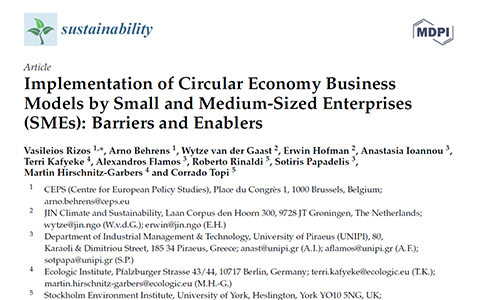
Small and medium-sized enterprises (SMEs) are increasing awareness of the benefits of closing loops and improving resource efficiency, such as saving material costs, creating competitive advantages, and accessing new markets. However, various barriers pose challenges to small businesses in their transition to a circular economy, such as lack of financial resources and technical skills. The aim of this paper is to increase knowledge and understanding about the barriers and enablers experienced by SMEs when implementing circular economy business models. Looking first at the barriers that prevent SMEs from realizing the benefits of the circular economy, an investigation is carried out in the form of a literature review and an analysis of a sample of SME case studies that are featured on the GreenEcoNet EU-funded web platform. Several enabling factors that help SMEs adopt circular economy practices are then identified.
READ MORERelated Articles
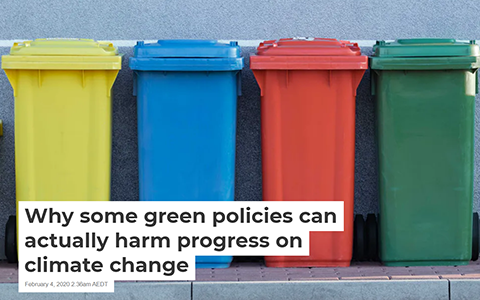
I studied low carbon technology and help SMEs in Liverpool and Lancashire to implement it. These companies are hit by levies and tariffs that are meant to incentivise more sustainable practices, but many lack the time and resources to implement them. As a result, they’re penalised, which further limits their capacity to catch up.
READ MORE
A coalition of major organizations has announced the launch of a groundbreaking one-stop-shop climate action platform for small and medium-sized enterprises (SMEs) to curb carbon emissions, build business resilience and gain a competitive advantage. The SME Climate Hub — co-hosted by the International Chamber of Commerce (ICC), the Exponential Roadmap Initiative, the We Mean Business coalition and the United Nations Race to Zero campaign — was launched at the 2020-edition of New York Climate Week. The SME Climate Hub will encourage small and medium-sized companies to commit to halving greenhouse gas emissions before 2030, reaching net-zero emissions before 2050.
READ MORE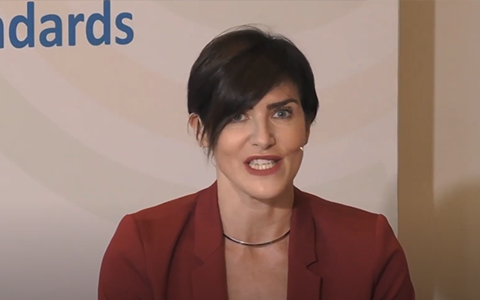
This year’s SBS conference, as a partner event of the EU Green Week 2021, focused on the opportunities and challenges of the circular economy for SMEs and showed how standards support the green transition. They can provide test and assessment methods and metrics on different aspects such as durability, reparability or energy efficiency. Standards can also help to promote more sustainable products and services and open markets for new products and technologies.
WATCH VIDEO
The greening of small and medium enterprises (SMEs) is an essential component of the green recovery. SMEs constitute most businesses throughout the world, and they face unique challenges in adopting greener practices. Some of these challenges are – access to finance, regulatory barriers, and information deficits. There are also additional barriers to SMEs looking to go green, not least in understanding what techniques and technologies are most appropriate in a given situation, what are the optimal ways to access them, and how to make sure that they enhance economic competitiveness.
READ MORERelated Articles

“Banyan Nation, for example, is using technology to support circular economy climate solutions in India. Century Tech is supporting personalized education options through combined innovations in learning science, AI and neuroscience.”
READ MORE
SMEs in the world with more than 400 million SMEs in Thailand, there are over 3 million. SME 360 degrees will help encourage all SMEs to be accepted and receive the exchange of goods and services. Benefit by quickly accumulating reward points for both buyers and sellers. It is a tool in the digital age that is used to exchange all over the world. SMEs can store and secure their business data as SME has its own blockchain. It offers digital payments including visa and mastercard form anyone else with with a smartphone SME. Similar it features Online shopping as SME 360 provide e-commerce marketplace. Besides all these attributes SME 360 even has a solution for SMEs who are facing financial challenges with business by helping them manage their supply chain more efficiently and gain access to financial capital together.
WATCH VIDEO
To help small and medium enterprises (SMEs) recover from the pandemic and prepare for the future, Mastercard has launched the Digital Acceleration for Small Businesses microsite across most of its Asia Pacific websites with information and resources on how to digitalize and run businesses more efficiently. The Digital Acceleration for Small Businesses center is available across Mastercard’s English-language websites for Singapore, Malaysia, the Philippines, Thailand, Hong Kong, India and Southeast Asia. To enhance the resources for SMEs, Mastercard has joined forces with website builder Wix and Zoho, a cloud solutions provider. These partners are sponsoring online guides and articles on various topics – from creating an online store and choosing a domain name to migrating to an online expense management and accounting platform.
READ MORE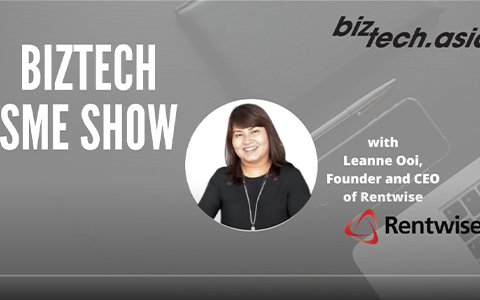
Rentwise is a leading provider of green IT infrastructure solutions with a unique IT rental acquisition option offering an end to end IT managed service based in Malaysia and Singapore. Leanne who started the company 20 years ago gives us an overview of the company and the remanufacturing space they are in. She tells us how remanufacturing can help enterprises on savings and to reduce their carbon footprint. She also shares on how the business has changed over the last 20 years and the company’s expansion plans.
READ MORE | WATCH VIDEORelated Articles
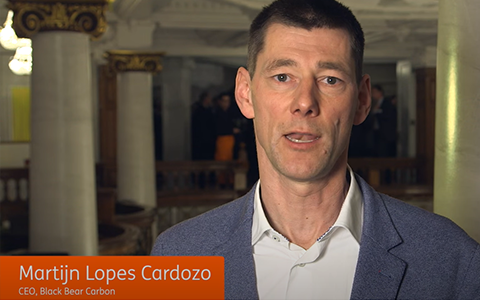
One of the big challenges for circular economy projects is scalability. We need to prove the model is profitable with our first plant, but then we need to be able to finance 20 plants at once, and not have to raise the money for each one on a case-by-case basis.
READ MORE | WATCH VIDEO
Global value chains present opportunities for SMEs to realize their potential to foster growth, employment, and innovation in emerging economies. Lead firms increasingly expect suppliers to meet labor and environmental criteria before joining their value chain. But a new survey conducted by the World Bank Group and German G20 Presidency finds that while largest buyers express a commitment to environmental protections and labor rights, relatively few provide financial services or incentives for businesses to upgrade their sustainability standards. Evidence presented in this paper shows that sustainability compliance can help firms become more competitive while making life better for workers and protecting the environment. Research also suggests that the costs of meeting standards can be prohibitive for SMEs, which often lack access to financing and technical expertise. Governments can help SMEs join sustainable global value chains by offering the financial resources and technical support they need to improve their sustainability performance.
READ MORE
Innovative, circular companies need access to knowledge, networks and funding to be able to grow. Traditionally, it is difficult for small- and medium-sized enterprises (SMEs) to obtain such access, especially for companies with innovative technologies or business cases: however, private equity firms can provide a funding solution. The UK-based private equity firm Circularity Capital was specifically created to invest in European growth SMEs operating in the circular economy. They combine a sound understanding of the circular economy with financial expertise, thereby providing businesses with access to knowledge, networks, and funding in the circular economy.
READ MORE
The transition to a circular economy represents an innovation challenge - new materials, services, and technologies are key to unlock the new technical and economic possibilities. Many startups working on innovation relevant to a circular economy face skepticism from the traditional venture capital world - often preferring to secure funding from a growing but left-field set of investors: impact investors, foundations, or corporate venture capital teams. As support for a circular economy grows among the powers that be, what signal does this send to investors and innovators alike.
WATCH VIDEOThe information provided in this site is for general information purposes only. The site may contain links to other websites or content belonging to or originating from third parties or links to websites and features in banners or other advertising. Such external links are not investigated, monitored, or checked for accuracy, adequacy, validity, eligibility, availability, or completeness by us. WE DO NOT WARRANTY, ENDORSE, GUARANTEE, OR ASSUME RESPONSIBILITY FOR THE ACCURACY OR RELIABILITY OF ANY INFORMATION OFFERED BY THIRD-PARTY WEBSITES LINKED THROUGH THE SITE OR ANY WEBSITE OR FEATURE LINKED IN ANY BANNER OR OTHER ADVERTISING. WE WILL NOT BE A PARTY TO OR IN ANY WAY BE RESPONSIBLE FOR MONITORING ANY TRANSACTION BETWEEN YOU AND THIRD-PARTY PROVIDERS OF PRODUCTS OR SERVICES.